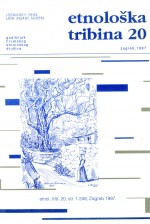Hrvatska etnologija poslije Gavazzija i Bratanića. Razmišljanje o političkom angažmanu u etnologiji
Croatian Ethnology after Gavazzi and Bratanić. Reflections on Political Engagement in Ethnology
Author(s): Dunja Rihtman-AuguštinSubject(s): Politics, Cultural Anthropology / Ethnology
Published by: Hrvatsko etnološko društvo
Keywords: Croatia; ethnology; politics; Milovan Gavazzi; Branimir Bratanić;
Summary/Abstract: Both Milovan Gavazzi and Branimir Bratanić were persons of strong individuality and personal integrity. Like most Europeans of their time, they were convinced that personal preferences and political commitment had to be absent from a scientific text. However, both were sincerely engaged in cultural activities of Seljačka sloga (Peasant Concord), organization for spreading knowledge among Croatian peasants, active between the two world wars under the auspices of the then very influential Croatian Peasant Party. They did not, however, take part in the politics and ideology of the Independent Croatian State (1941-1945). They insulated Croatian ethnology from potential pressures of Marxist ideology and other political invective, by distancing themselves from politics in post-world war Yugoslavia. This distance from politics is interpreted as a fruitful strategy for escaping authoritarian pressures. However, negative effects of distancing and silence are also noted, such as stagnation of the discipline and the decline of its reputation. In the final part of the paper the author discusses the relation between researchers-ethnologists and politics, placing it within the discussion on ethics in anthropology published in Current Anthropology 36 (3), 1995. The author writes further about the reactions of contemporary Croatian ethnologists to the war in their own country which faced them/us with political questions and turned them into researchers-witnesses, not letting them be merely professional observers. She argues for a political anthropology approach and for a critical relationship between ethnological discourse and power structures.
Journal: Etnološka tribina : Godišnjak Hrvatskog etnološkog društva
- Issue Year: 27/1997
- Issue No: 20
- Page Range: 83-93
- Page Count: 11
- Language: Croatian

